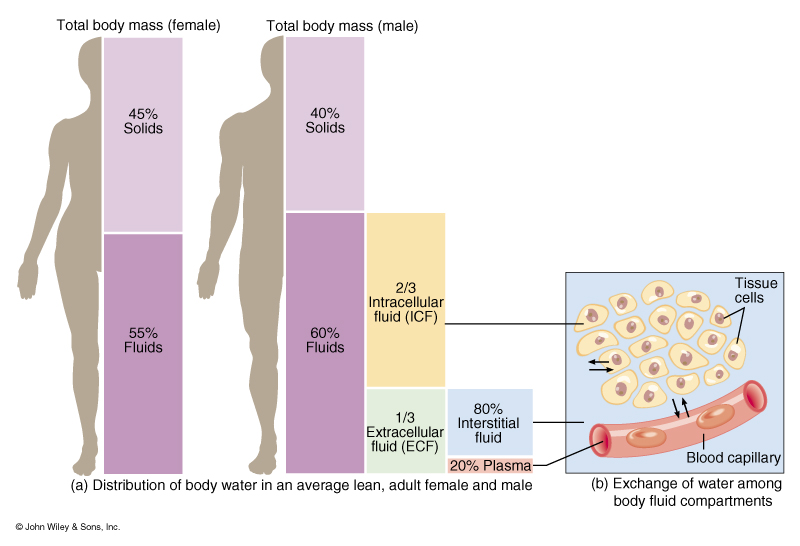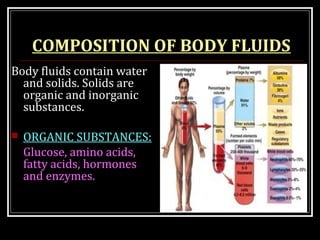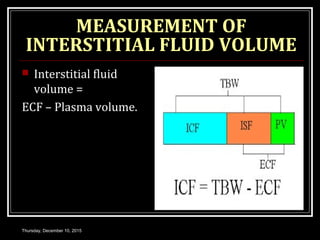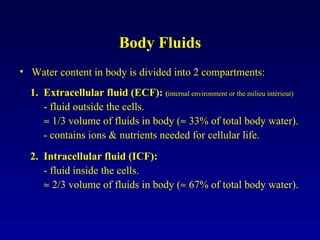The Largest Volume of Body Fluid Is Located
In a 72-kg body containing 40 litres of fluid about 25 litres is intracellular which amounts to 625. The largest volume of body fluid by far lies.
The percent of body water changes with development because the proportions of the body given over to each organ and to muscles fat bone and other tissues change from infancy to adulthood.

. Intracellular fluid is approximately 40 of the total body weight. The distribution of fluid throughout the body can be broken down into two general categories. The largest volume of body fluid is located a.
It is primarily divided into two types that is ICF intracellular fluid and ECF extracellular fluid. Intracellular fluid and extracellular fluid. The remaining one-third of body water is outside cells in the extracellular fluid compartment ECF.
The extracellular fluid also includes the transcellular fluid. The ECF is the bodys internal environment and the cells external environment. The extracellular fluid can be divided into two major subcompartments.
Extracellular fluid 13 of body water is fluid contained in areas outside of cells. Estimates of the relative sizes of these two pools differ significantly depending on the tracer used to measure the ECF volume but most studies in animals and humans have indicated that 55 to 65 of TBW resides in the ICF and 35 to 45 is in the ECF. Total body water depends upon.
The largest volume of body fluid is located a. Dissociate into anions and cations. Interstitial fluid and blood plasma.
The body fluid compartments in the body can be divided into. They all contain _____ a. The components that add volume to blood include red blood cells erythrocytes white blood cells leukocytes platelets and plasma.
Bone DNA RNA ATP and cell membranes all have one thing in common. It is the fluid present within the cells of the body that is fluid enclosed by the. The rate of fluid intake and outtake is how much higher in an infant than in an adult.
The interstitial fluid volume is about 12 liters the vascular volume is about 4 liters. Levels of which of the following are regulated by aldosterone. Infants have _____water in comparison to body weight than adults of either sex.
The ECF contains roughly one-third of the total body water or about 20 of total body weight. The ICF makes up about 60 percent of the total water in the human body and in an average-size adult male the ICF accounts for about 25 liters seven gallons of fluid Figure 264This fluid volume tends to be very stable because the amount of water in living cells is. It is the total space within cells primarily defined as the cytoplasm of cells.
Body water or body fluid is the liquid present within the body of living organisms. Interstitial fluid is 11 litres. Intracellular fluid is the cytosol of cytoplasm a fluid located within the membrane of tissue cells.
The Extracellular Fluid ECF refers the total volume of fluid outside of cells. For a 40-litre body about 15 litres is extracellular which amounts to 375. The largest volume of body fluid is located.
The ICF makes up about 60 percent of the total water in the human body and in an average-size adult male the ICF accounts for about 25 liters seven gallons of fluid. The percent of body water changes with development because the proportions of the body given over to each organ and to muscles fat bone and other tissues change from infancy to adulthood Figure 2611. Magnesium a higher concentration of potassium than interstitial fluid.
The ECF compartment is divided into the interstitial fluid volume the fluid outside both the cells and the blood vessels and the intravascular volume also called the vascular volume and blood plasma volume the fluid inside the blood vessels in a three-to-one ratio. The ICF lies within cells and is the principal component of the cytosolcytoplasm. Blood volume refers to the total amount of fluid circulating within the arteries capillaries veins venules and chambers of the heart at any time.
Extracellular fluid ECF or extracellular fluid volume ECFV usually denotes all the body fluid that is outside of the cells. As mentioned before the ECF is separated from the ICF by the plasma membrane of each cell which is impermeable to nearly all classes of solutes. This makes up only about 25 of the ECF.
If A Person Is Suffering Swelling To The Upper Bodybruisingblood Loss Pain And Fluid Retention What Would A Possible Diagnosis Of The Ailment Be. Plasma accounts for about 60 of total blood volume while. Intracellular fluid 23 of body water is fluid contained within cells.
Bone DNA RNA ATP and cell membranes all have one thing in common. Average 70 kg adult human 42 liters 60 of total body weight ICF contains 28L ECF contains 14 L. The correct answer is D Intracellular fluid.
Jacksons texts states 70 of body fluid is intracellular. Your brain and kidneys have the highest proportions of water which composes 8085 percent of their masses. About two-thirds is in the intracellular fluid compartment ICF.
The ICF lies within cells and is the principal component of the cytosolcytoplasm. The intracellular fluid is the fluid within the cells of the body. Your brain and kidneys have the highest proportions of water which composes 8085 percent of their masses.
Intracellular fluid accounts for the largest amount of body water. Total body water TBW is distributed between the intracellular fluid ICF and extracellular fluid ECF compartments. Plasma is 3 litres.
There is a rapid_____in the proportion of body water to.

Fluid And Electrolytes On Pinterest Extracellular Fluid Electrolytes Nursing Nursing Programs Nursing School Prerequisites

Physiology Figure Body Fluid Compartments Of A 70 Kg Adult Man Physiologyweb

Body Fluid Volume An Overview Sciencedirect Topics

Body Fluids And Fluid Compartments Anatomy And Physiology Ii

Physiology Illustration Three Major Body Fluid Compartments Intracellular Fluid Interstitial Fluid And Plasma Physiologyweb

Sodium Volume Fluid And Electrolytes Nicu Nurse Body Fluid

Electrolyte Fluid Balance Electrolytes Nursing Anatomy And Physiology Fluid And Electrolytes

Digestive System Diagram Human Digestive System Human Anatomy And Physiology Digestive System Anatomy

Body Fluids And Fluid Compartments Anatomy And Physiology Ii

Ap2 Final Chapter 20 Lymphatic System Lymphatic System Lymphatic System Anatomy Lymphatic Drainage Massage

Electrolyte Fluid Balance Electrolytes Nursing Fluid And Electrolytes Extracellular Fluid

Body Fluids And Fluid Compartments Anatomy And Physiology Ii

Blood Vessels Contain One Of The Body S Three Fluid Compartments Is The Fluid Contained Within Called Plasma Intracellular Fluid Interstitial Fluid Or Cytoplasm Socratic

Bios252 A P Ii Final Exam Essay And Review Question Answer Graded A Chamberlain College Of Nursing 100 Correct In 2022 Extracellular Fluid Body Fluid Exam

Body Fluids And Fluid Compartments Anatomy And Physiology Ii





Comments
Post a Comment